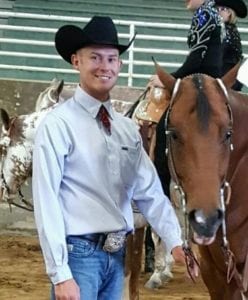Breed associations make rules and bylaws in order to fulfill their charters, expand their membership, improve the breed, and ensure fair competition for all.
The only way to establish respect for these rules is to enforce them across the board without favoritism – after all, justice is said to be “blind” for a reason. However, black and white policies are easy to enforce on paper and difficult to apply in the inevitable grey areas that occur in the real world.
Recently, social media erupted into debate over the APHA’s handling of one such grey area.
The Violation (Rylee’s Story)
 Rylee Morgan (daughter of APHA trainer Sandi Morgan) and her gelding Ima Lopin Sensation (aka Simon) won the 3-year-old maiden HUS class and the Open Stakes Championship class at the 2022 APHA World Show.
Rylee Morgan (daughter of APHA trainer Sandi Morgan) and her gelding Ima Lopin Sensation (aka Simon) won the 3-year-old maiden HUS class and the Open Stakes Championship class at the 2022 APHA World Show.
Shortly thereafter, Rylee received a letter indicating that Simon had tested positive for a banned substance and she would be required to return all awards, including $11,000 in winnings, she would either be placed on probation or suspension, and the drug violation would be published in the APHA journal.
Shocked by this revelation, Rylee asked the Association to clarify which substance was found and the amount present in the lab report. She was informed Simon had tested positive for caffeine in trace amounts.
After investigating the source of the caffeine, it was suspected that came from the peanut M&Ms she had fed Simon as a “treat” the day of the class. Rylee believed this would be a laughable moment for the committee and requested a meeting with them to discuss what had happened in hopes they would understand and everyone could move forward.
Rylee had the supporting testimony of three independent equine veterinarians, who all opined that the trace amount of caffeine from the candy would in no way impact the horse’s performance. Again, Rylee believed her lack of intention to break the rule paired with the lack of impact on Simon’s performance would be enough to exonerate her.
Final Result
Devastated by her potential punishment, Rylee hired an attorney to represent her concerns at the Disciplinary Committee hearing, but the Association held firm to its “no drug” policy. While the committee agreed the issue was likely with the candy, and not some other drugging agent, it ruled that the administration of a banned substance requires punishment to ensure equal treatment for all members.
The parties agreed to the following sentence: Rylee still was required to return the $11,000 and all her awards, including her trophies, vests, and ribbons. Rylee will not be on probation or suspension. And the drug test is published in the APHA Journal, with the caveat that the “drug” was peanut M&M candies.
As a result of this strange parenthetical in the published report, social media has erupted with angry APHA members expressing their outrage over what they perceive to be a ridiculous violation, especially when “real drugs” and real “bad actors” remain an issue.
APHA’s Position
According to Billy Smith, APHA Executive Director, “APHA is committed to due process for every member accused of violating APHA rules. Caffeine is a forbidden substance regardless of how it is ingested. Theobromine and Theophylline are conditionally permitted drugs but must be reported to APHA and must be withheld from showing for 24 hours after the last administration. The range of punishment for a forbidden substance is a fine of up to $5,000, suspension of up to 12 months, probation of up to 24 months, and loss of awards. Every member accused of violating APHA rules has the right to go through our disciplinary process and if they disagree with the findings, they have the right to appeal to the Board of Directors. In this case, this member did not take advantage of her right to appeal.”
Beware What You Feed Your Horse
 According to Rylee, “Anyone who knows me, my mom, and our program knows we would never give anything to any of our horses that would intentionally alter their performance. Simon is my angel in a horse suit! He is an incredible horse and I’m frustrated and heartbroken that this hurt his reputation. He deserves so much more. And now I’m out to prove that he can be successful without M&Ms.”
According to Rylee, “Anyone who knows me, my mom, and our program knows we would never give anything to any of our horses that would intentionally alter their performance. Simon is my angel in a horse suit! He is an incredible horse and I’m frustrated and heartbroken that this hurt his reputation. He deserves so much more. And now I’m out to prove that he can be successful without M&Ms.”
Rylee wants her story to be a cautionary tale to exhibitors, “I want the public to be aware of what happened so it doesn’t happen to them. It was an innocent mistake, and I’d hate for anyone else to go through what I did. The best we can do is hopefully inform the public.”
Two Schools of Thought
The question here is simple but controversial: should the Association enforce the letter of the law or the intent behind the law where the two are in conflict? Indeed, the Association must enforce its own rules, but, in doing so, it does not want to allow enforcement of rules to feel arbitrary or capricious such that people lose faith in the governing body.
In the legal context, there are two ways of interpreting statutes and rules: the languag e of the rule itself (what does it say?) and the legislative intent behind the rule or law (what did it intend to say?).
e of the rule itself (what does it say?) and the legislative intent behind the rule or law (what did it intend to say?).
Here, the letter of the rule is that horses shall not have certain banned substances in their systems – caffeine being one of them. The intent of the rule is to dissuade exhibitors and trainers from knowingly giving horses banned substances that enhance their performance, or to prevent an exhibitor from reaping the benefits of a horse whose performance was actually enhanced by drugs.
Here, APHA stuck to the letter of the law despite evidence the substance (1) was not knowingly given and (2) was not ingested in an amount that would have had a measurable impact on the animal’s performance.
Now, exhibitors and trainers alike are sounding off due to this seeming conflict between the letter of the law and the impact of the decision in this unique circumstance.
Trainer Take
“I think it’s absolutely ridiculous,” says APHA trainer Brian Henry. “I fully understand and support drug testing, however, I think we also need to utilize common sense when applying the rules. This was an absolute accident. We try to be so careful with supplements, topical sprays, poultices, etc., but sharing a little treat with your horse? It’s infuriating.”
Henry conti nues, “Rulings like this are discouraging to existing members and most certainly anyone thinking about wanting to show at breed shows. I worry the association is losing touch with its membership. I love our industry and I wish this could have been a teachable moment instead of another way for people to complain about our Association.”
nues, “Rulings like this are discouraging to existing members and most certainly anyone thinking about wanting to show at breed shows. I worry the association is losing touch with its membership. I love our industry and I wish this could have been a teachable moment instead of another way for people to complain about our Association.”
“I want to believe that APHA has the integrity of competition and the safety of the horses at heart. But I worry that this case sets up a feeling where people believe the Association is out to get them for seemingly innocuous behavior – like giving your horse a treat,” laments APHA trainer Amber Duckett.
“At the end of the day, the Association has limited resources and I worry about the tone they are setting with choosing a hard line on this case,” Duckett warns. “I think this is a moment to really decide the future of enforcement. Is it worth pursuing trace amounts of caffeine, or is it better to pursue injecting necks, or other more invasive forms of doping? I’d like to see the Association expend more resources on drug testing at shows other than the World Show. It just seems there are bigger issues to deal with that actually matter to the membership and actually protect the animals.”
Looking to the Future
Like all great intentions, their true value is found in the practical application and effect, n ot merely in the intention itself. Indeed, exhibitors need to be careful what they feed their horses, even if they did so with good intentions. That said, unintended consequences are also a great way to measure the efficacy of a policy and make amendments to better suit the purpose of the rule and the Association membership.
ot merely in the intention itself. Indeed, exhibitors need to be careful what they feed their horses, even if they did so with good intentions. That said, unintended consequences are also a great way to measure the efficacy of a policy and make amendments to better suit the purpose of the rule and the Association membership.
This is your chance to weigh in. Associations want feedback to better draft and amend their rules and the enforcement thereof.
Where do you fall? Do you want the Associations to adhere to the letter of the law without exception? Or, do you fall into the camp of desiring enforcement of the intent of the rule? Perhaps you are somewhere in the middle: adhering to bright-line rules is necessary in some circumstances (like compliance with deadlines, acceptable equipment, age divisions in classes, etc.) and a case-by-case analysis is necessary in others?
Sound off in our comments and, as always, let your voice be heard by your Association’s representatives. Posting on social media doesn’t always translate to desired change, but having direct contact with your local representative can make a real difference.








